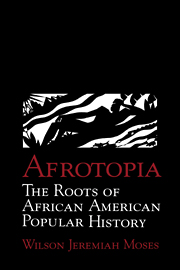Book contents
- Frontmatter
- Contents
- Acknowledgments
- Dedication
- 1 Introduction
- 2 Varieties of Black Historicism
- 3 From Superman to Man
- 4 Progress, Providence, and Civilizationism
- 5 W. E. B. Du Bois and Antimodernism
- 6 Afrocentrism, Cosmopolitanism, and Cultural Literacy in the American Negro Academy
- 7 Caliban's Utopia
- 8 Barbarism Grafted onto Decadence
- 9 Conclusion
- Notes
- Index
3 - From Superman to Man
A Historiography of Decline
Published online by Cambridge University Press: 10 November 2009
- Frontmatter
- Contents
- Acknowledgments
- Dedication
- 1 Introduction
- 2 Varieties of Black Historicism
- 3 From Superman to Man
- 4 Progress, Providence, and Civilizationism
- 5 W. E. B. Du Bois and Antimodernism
- 6 Afrocentrism, Cosmopolitanism, and Cultural Literacy in the American Negro Academy
- 7 Caliban's Utopia
- 8 Barbarism Grafted onto Decadence
- 9 Conclusion
- Notes
- Index
Summary
Historians have long recognized that significant numbers of Christianized “Africans” at the time of the American Revolution viewed themselves as people of a New Covenant, a chosen people whose messianic destiny was overseen by a merciful Providence. Christian teaching revealed that God was always on the side of the oppressed, and that the lowly were destined to be exalted. It is well known that many black people viewed slavery in America as analogous to the bondage of Israel, “away down in Egypt's Land.” Ironically, however, African Americans have often been torn by a contradictory desire to identify with the Egyptians as well. Anthropologists and other scholars are fond of reminding us that it is in the nature of mythologies to reconcile contradictions, for mythologies must accommodate the diverse spiritual goals of complex aggregations of people – not to mention the paradoxes within individual psyches.
This need to reconcile contradictions is illustrated in the personal mythology of Olaudah Equiano. Writing under the Christian name of Gustavus Vassa in 1789, he demonstrated his desire to identify with Christian traditions, and a simultaneous need to explain and defend his native West African customs. Although he was the victim of a slave trade instigated and defended by Bible-bearing Christians, he was eager to identify himself and his people with biblical history. His motivations for doing so were complex. First of all, like several other Christianized African writers of the period, he wanted to transfer biblical history and Christian teaching into weapons in his crusade against slavery.
- Type
- Chapter
- Information
- AfrotopiaThe Roots of African American Popular History, pp. 44 - 95Publisher: Cambridge University PressPrint publication year: 1998

